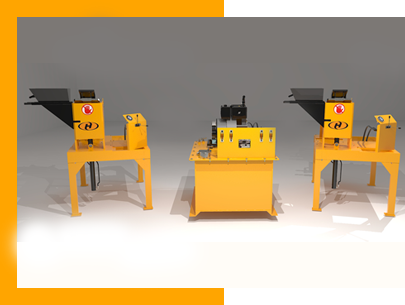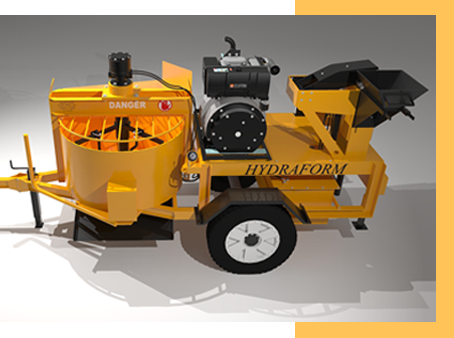Enhancing Alternative Building Technology foot print.
Hydraform building technology offers a cost-effective and sustainable alternative to the conventional brick and mortar masonry without changing the basics of the conventional building system.

The machine manufactured by Hydraform offers the ease of production in a factory as well as on-site production. And the use of interlocking blocks makes it possible the onsite production of blocks of required shapes and sizes. These machines are suitable for the locally available environment-friendly raw materials such as fly ash, subsoil, agricultural residues and other waste materials mixed with sand and cement.
The tongue and groove mechanism used in interlocking profile gives an auto-fix among the blocks which enhances structural stability thus reducing the requirement of mortar or slurry. The walls made up through this technique hardly require cement plaster as the pre-pointed straight masonry and face brick finish renders an elegant and attractive look.

Minimal material cost – Due to the structural strength offered by interlocking technique the requirement for mortar is reduced which translates into minimization of material cost.
Reduced transportation cost – Hydraform offers machines which are fixed on road worthy tire mounted tow hitch trolley chassis which enables easy onsite portability and production thus reducing transportation cost to proportionately negligible.
Fast Construction – An expert block layer team can lay up to 800 blocks per day which are equivalent to laying 2400 standard stock bricks per day. Also, no post-construction work is required on wall masonry.
Versatile Construction Technique –Hydraform blocks are compatible with all window, door, slab and roofing systems that are used with conventional systems which speak volumes of its versatility.
Easy Construction – Hydraform dry-stacked masonry is so easy to learn and implement that even unskilled labors can be trained to do masonry with minimal efforts. Hydraform also assists in the training of the on-site production crew.
Eco-friendly Construction –The raw material used for manufacturing blocks includes the harmful industrial waste as well as the agricultural residues which therefore helpin efficient waste management. Water consumption is also less compared to the conventional techniques as it requires much less mortar /slurry. Average soil cement Hydraform block wall has a carbon footprint that is as low as 40 kg CO2 per square meter.
Load bearing and framed structures – Hydraform Blocks can be made with high compressive strength for Load-bearing structures. The strength and density can be customized according to the varied fly ash suiting the technical specification for framed / multi-storied construction.